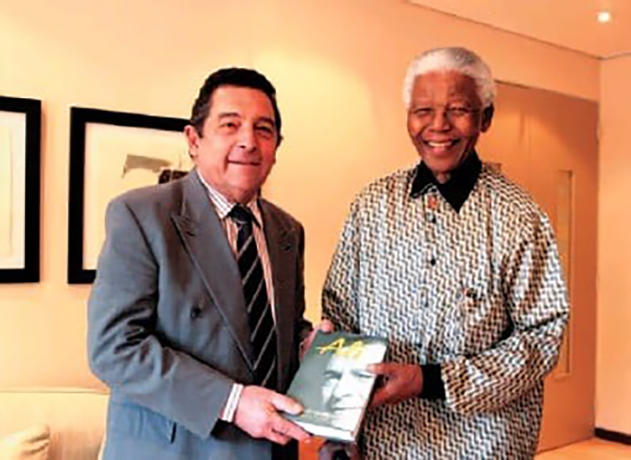click to dowload our latest edition
CLICK HERE TO SUBSCRIBE TO OUR NEWSLETTER


Published
3 years agoon
Former South African cricket captain and veteran administrator Ali Bacher has been criticised for defending Proteas coach Mark Boucher, who has been accused of racial discrimination during his years playing for South Africa.
Bacher has been steadfast in his support for Boucher, telling the SA Jewish Report this week that he’s not surprised by the flak he has taken as we live in a democratic country where everyone has the right to freedom of expression.
The accusations were made in Cricket South Africa’s (CSA’s) social justice and nation building hearings into racial discrimination. Boucher has since apologised “unreservedly for any offensive conduct, real or perceived, that has been attributed to me”.
Boucher went on to say, “We, the team, coaching staff, selectors and CSA, during the period in question, should have been more sensitive and created an environment where all members of the team could raise and talk about these issues without allowing them to fester, as they clearly have.”
In an article in the Sunday Times on 29 August 2021, Bacher said, “Let me simply put it like this: Mark Boucher is one of the best cricketers this country has ever produced. He has apologised for what he has said previously. We all make mistakes.”
In the “letters to the editor” section of the following week’s Sunday Times, Bacher was criticised. “Neither Bacher nor some of his teammates who have suddenly found their voices spoke out against apartheid sport or racism in society at that time,” wrote one reader.
However, Bacher did make a stand in the apartheid era through his actions. In 1976, Bacher and the South African Cricket Union introduced “normal cricket” to playing fields across the country. With the cricket community split over the politics of race, “normal cricket” was an attempt to integrate the sport in South Africa, allowing black teams to play white teams on formerly whites-only playing grounds.
He soon realised that cricket had no long-term future in the country unless cricketers in formerly disadvantaged communities were encouraged to reach their full potential. As a result, he organised mass coaching clinics and development programmes in townships in the 1980s.
In 2009, Bacher told The Sunday Independent, “I never voted for the National Party, never supported apartheid. Many times I was castigated by state media for that.”
Bacher had the foresight to form a single, colour-independent body to oversee all cricket in South Africa. Asking Steve Tshwete to help get the parties to agree on such a unified entity, he became friends with the head of the African National Congress’s (ANC’s) sports desk. This was followed by a London visit, in which South Africa was admitted to the International Cricket Council (ICC) in 1991.
Another letter writer wrote, “As far as Bacher and his ilk are concerned, they need to be reminded of the role they played in trying to prop up apartheid sport with those rebel tours in the 1980s.”
With apartheid South Africa excluded from the ICC and test match cricket, Bacher believed that “rebel” tours were essential to maintain playing levels in South Africa.
Although six previous rebel tours had passed smoothly, the 1989-1990 one against England coincided with the unbanning of the ANC and Nelson Mandela’s release from prison. Bacher was hit for six by angry demonstrators who simply hadn’t been allowed to show their frustration and resentment on previous occasions.
“That tour nearly finished me off emotionally,” Bacher told The Guardian in 2010. “When we had the previous rebel tours, there were packed crowds, mainly white people, no demonstrations. I thought that the country, the people, had no problem [with it]. I must confess that if I had known the anger and the hurt that those tours would cause, I would have thought twice about them. It was very hurtful for me. I had been a liberal all my life.”
Realising he had made a major political error, he negotiated to halt the tour, bringing an end to the “rebel” era.
Another letter writer claimed, “White people like Ali Bacher are still very arrogant. You don’t know the pain, Mr Bacher. You have never experienced that kind of pain and humiliation.”
A general practitioner by profession, Bacher’s work as a doctor at the teeming Baragwanath Hospital on the outskirts of Soweto made him painfully aware that the South Africa in which most of his countrymen lived and died was a vastly different place to that inhabited by suburban, privileged whites, who had access to superb sporting facilities at institutions like King Edward VII School, where he had been a prodigy.
Said Bacher this week, “Amongst the black community, in the 1970s and 1980s, I have no doubt that there were many fine, aspiring young cricketers who, if given the opportunities, encouragement, facilities, and coaching that our white cricketers experienced, would have come through too and reached international stardom.”

cliff livingstone
Sep 17, 2021 at 10:19 am
If all current sport administrators, coaches, and selectors had half of what Ali Bacher stands for in this country….we would have far better people and sports results.